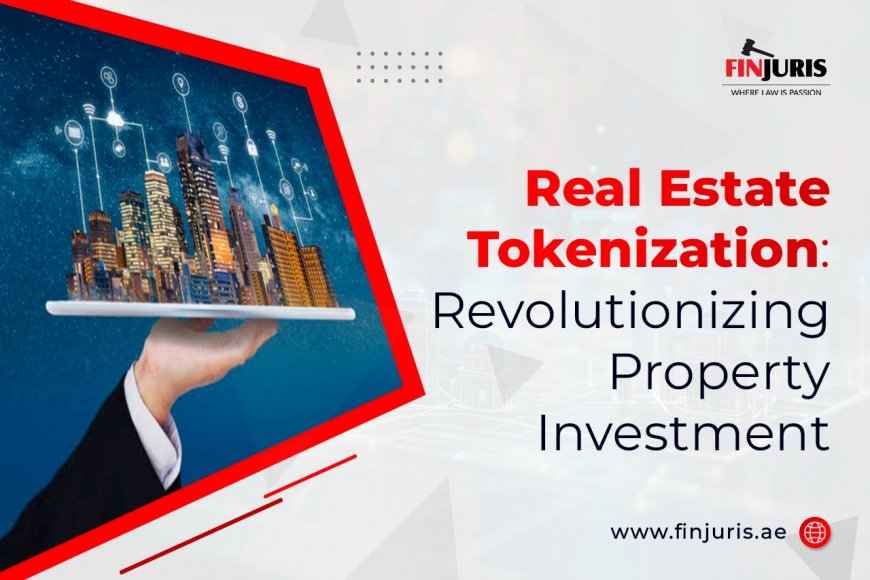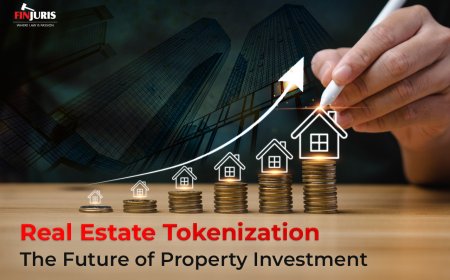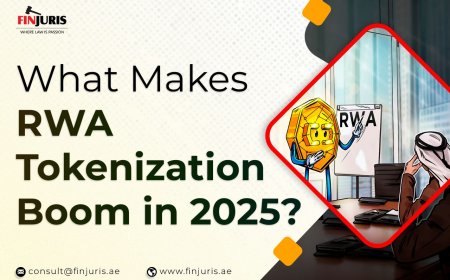Real Estate Tokenization: Revolutionizing Property Investment
Learn how real estate tokenization is revolutionizing property investment. Explore how blockchain technology makes property ownership more accessible, liquid, and efficient for investors.

The emergence of blockchain technology has created opportunities in many different industries, but one of the most innovative is real estate. The tokenization of real estate is one of the most fascinating advances in this industry. Through this method, real estate assets are transformed into digital tokens that can be exchanged on a blockchain, increasing the accessibility, liquidity, and efficiency of real estate investing. The idea of real estate tokenization is examined in this article, along with its advantages, disadvantages, and prospective implications for the real estate industry.
What is Real Estate Tokenization?
The practice of breaking up a property into fractional shares, which are subsequently represented as digital tokens on a blockchain, is known as real estate tokenization. Just like any other digital asset, these tokens may be purchased, sold, or traded. Investors can buy tokens to acquire a portion of the asset since each token represents a piece of ownership in the property.
Real estate and other traditionally illiquid assets can be transformed into liquid forms through tokenization. Because of this, investors now have access to a degree of liquidity in real estate investments that were previously impossible by buying or selling their tokens on secondary markets. Additionally, fractional ownership is made possible via tokenization, allowing investors to acquire smaller amounts of an asset rather than the complete one.
How Does Tokenization for Real Estate Operate?
Tokenization entails the following steps:
Selection of Assets: Finding the real estate asset that will be tokenized is the first step. This might be a single home, a business, or perhaps a collection of properties.
The Token's Structure: Next, the property is split up into fractional ownership shares, with a digital token standing in for each share. The whole value of the property is reflected in the total number of tokens issued. For example, if one million tokens are distributed and a property is worth $1 million, then each token would be worth $1 of the property's value.
Lawful Structure: Establishing a legislative framework that controls the ownership rights and responsibilities related to the tokens is essential. This entails creating a trust or special purpose vehicle (SPV) to keep the assets and distribute the tokens while making sure all applicable laws are followed.
Token Issuance: The tokens are distributed on a blockchain network when the necessary legal framework is in place. Following that, investors will be able to buy these tokens and get a portion of the property.
Exchange and Secondary Market: Following their issuance, the tokens may be exchanged on exchanges or secondary markets that deal with tokenized assets. Investors can use this liquidity to purchase or sell their tokens as needed.
Real Estate Tokenization's Advantages
Tokenization of real estate has several advantages for both investors and property owners:
Enhanced Liquidity: The improved liquidity that tokenization offers the real estate market is one of its biggest benefits. The sale of a traditional real estate investment sometimes takes months or even years, making them infamously illiquid. The fractionalization of assets made possible by tokenization enables investors to purchase and sell their shares on secondary markets with speed and efficiency.
Fractional Ownership: The entrance hurdles for real estate investing are lowered via tokenization. Rather than requiring a substantial amount of money to acquire a whole property, investors can purchase fractional, smaller portions. This makes real estate more accessible to a wider spectrum of people, enabling them to engage in the market.
Worldwide Availability: Investments in real estate are now accessible globally because of blockchain technology. Tokens that represent a portion of a property may be bought by investors globally, eliminating the need for middlemen or difficult cross-border transactions.
Openness and Safety: Tracking ownership and transactions is made visible and safe by blockchain technology. A transparent and unchangeable record of ownership is provided by the blockchain, which documents every token transaction. This lowers the possibility of fraud and guarantees that everyone involved in the transaction process has faith in it.
Reduced Transaction Expenses: The expenses involved in purchasing and selling real estate can be decreased via tokenization by doing away with middlemen like brokers and attorneys. Lower transaction costs result from the process's increased automation and streamlining through the usage of smart contracts.
Diversification of Portfolios: Through tokenization, investors may buy fractional shares in several assets located in various regions and industries, therefore diversifying their portfolios. This lowers risk and offers a better-rounded approach to investing.
Challenges in Real Estate Tokenization
Real estate tokenization has numerous advantages, but it also has drawbacks.
Uncertainty in Regulations: The tokenized asset regulatory landscape is continuously developing. Regulations governing the issue and exchange of digital tokens vary by nation, and it is sometimes unclear how these laws relate to the tokenization of real estate. Both issuers and investors may be exposed to legal and compliance risks as a result of this ambiguity.
Adoption of Technology: Even if blockchain technology is becoming more widely used, many real estate industry players still need to go through a learning curve. To properly comprehend and use the technology, property owners, investors, and regulators might need to make investments in education and training.
Maturity of the Market: Tokenized real estate is still a very new market. Even if the market has a lot of promise, it will take time for secondary markets to establish enough liquidity and for the industry to mature. There may be difficulties for early adopters in terms of price discovery and market depth.
Legal and Fiscal Consequences: There are significant tax and legal implications when real estate is tokenized. There are legal and tax ramifications to the formation of SPVs, the issuing of tokens, and the distribution of income from tokenized assets that must be carefully considered. It is important to adhere to current rules and regulations to prevent legal complications.
Pricing and Valuation: It might be difficult to assess a tokenized asset's worth. There can be situations when standard real estate appraisal techniques aren't appropriate, and finding a reasonable market value for tokens on secondary markets might be difficult. Investors may experience volatility and uncertainty as a result of this.
Real Estate Tokenization has the potential to completely transform the world of real estate investing by increasing accessibility, liquidity, and efficiency. The potential advantages of tokenization are substantial, notwithstanding the obstacles that must be addressed. The tokenization of real estate is expected to become a common way for people to invest in real estate as blockchain technology develops and legal frameworks are clarified. Understanding and utilizing this technology might open up new avenues for real estate investing and change the course of the industry for both property owners and investors.
What's Your Reaction?




















